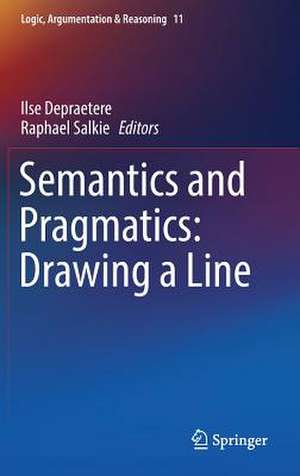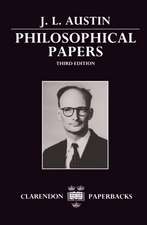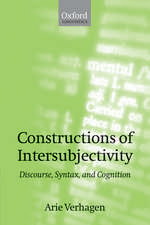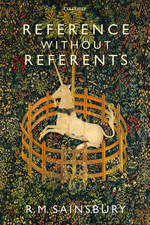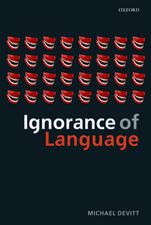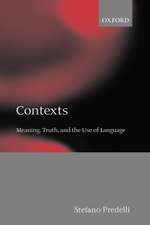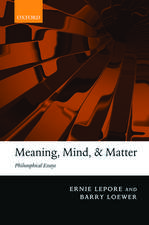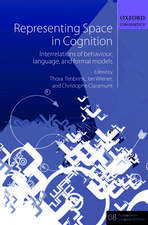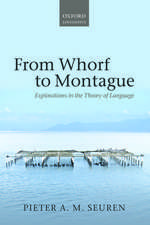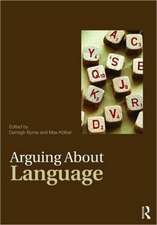Semantics and Pragmatics: Drawing a Line: Logic, Argumentation & Reasoning, cartea 11
Editat de Ilse Depraetere, Raphael Salkieen Limba Engleză Hardback – 23 mar 2017
This book explores new territory at the interface between semantics and pragmatics, reassessing a number of linguistic phenomena in the light of recent advances in pragmatic theory. It presents stimulating insights by experts in linguistics and philosophy, including Kent Bach, Philippe de Brabanter, Max Kölbel and François Recanati. The authors begin by reassessing the definition of four theoretical concepts: saturation, free pragmatic enrichment, completion and expansion. They go on to confront (sub)disciplines that have addressed similar issues but that have not necessarily been in close contact, and then turn to questions related to reported speech, modality, indirect requests and prosody.
Chapters investigate lexical pragmatics and (cognitive) lexical semantics and other interactions involving experimental pragmatics, construction grammar, clinical linguistics, and the distinction between mental and linguistic content. The authors bridge the gap between different disciplines, subdisciplines and methodologies, supporting cross-fertilization of ideas and indicating the empirical studies that are needed to test current theoretical concepts and push the theory further.
Readers will find overviews of the ways in which concepts are defined, empirical data with which they are illustrated and explorations of the theoretical frameworks in which concepts are couched. This exciting exchange of ideas has its origins in the editors’ workshop series on the theme ‘The semantics/pragmatics interface: linguistic, logical and philosophical perspectives’, held at the University of Lille 3 in 2012-13. Scholars of linguistics, logic and philosophy and those interested in the research benefits of crossing disciplines will find this work both accessible and thought-provoking, especially those with an interest in pragmatic theory or semantics.
| Toate formatele și edițiile | Preț | Express |
|---|---|---|
| Paperback (1) | 513.15 lei 38-44 zile | |
| Springer International Publishing – 3 mai 2018 | 513.15 lei 38-44 zile | |
| Hardback (1) | 524.13 lei 38-44 zile | |
| Springer International Publishing – 23 mar 2017 | 524.13 lei 38-44 zile |
Din seria Logic, Argumentation & Reasoning
- 8%
 Preț: 528.74 lei
Preț: 528.74 lei - 20%
 Preț: 580.84 lei
Preț: 580.84 lei - 15%
 Preț: 650.19 lei
Preț: 650.19 lei - 15%
 Preț: 643.48 lei
Preț: 643.48 lei - 18%
 Preț: 723.06 lei
Preț: 723.06 lei -
 Preț: 394.12 lei
Preț: 394.12 lei - 15%
 Preț: 695.53 lei
Preț: 695.53 lei - 15%
 Preț: 643.34 lei
Preț: 643.34 lei - 20%
 Preț: 513.15 lei
Preț: 513.15 lei -
 Preț: 398.92 lei
Preț: 398.92 lei -
 Preț: 387.96 lei
Preț: 387.96 lei - 15%
 Preț: 643.34 lei
Preț: 643.34 lei - 15%
 Preț: 490.93 lei
Preț: 490.93 lei - 18%
 Preț: 726.23 lei
Preț: 726.23 lei - 18%
 Preț: 733.78 lei
Preț: 733.78 lei - 18%
 Preț: 895.56 lei
Preț: 895.56 lei - 15%
 Preț: 696.02 lei
Preț: 696.02 lei - 15%
 Preț: 634.68 lei
Preț: 634.68 lei -
 Preț: 354.54 lei
Preț: 354.54 lei - 18%
 Preț: 723.38 lei
Preț: 723.38 lei - 18%
 Preț: 723.56 lei
Preț: 723.56 lei - 24%
 Preț: 801.70 lei
Preț: 801.70 lei - 15%
 Preț: 634.49 lei
Preț: 634.49 lei - 18%
 Preț: 728.43 lei
Preț: 728.43 lei - 18%
 Preț: 789.98 lei
Preț: 789.98 lei - 18%
 Preț: 787.78 lei
Preț: 787.78 lei - 18%
 Preț: 918.30 lei
Preț: 918.30 lei - 15%
 Preț: 657.25 lei
Preț: 657.25 lei -
 Preț: 397.16 lei
Preț: 397.16 lei -
 Preț: 392.97 lei
Preț: 392.97 lei
Preț: 524.13 lei
Preț vechi: 655.16 lei
-20% Nou
Puncte Express: 786
Preț estimativ în valută:
100.30€ • 108.92$ • 84.26£
100.30€ • 108.92$ • 84.26£
Carte tipărită la comandă
Livrare economică 18-24 aprilie
Preluare comenzi: 021 569.72.76
Specificații
ISBN-13: 9783319322452
ISBN-10: 3319322451
Pagini: 365
Ilustrații: VI, 357 p. 4 illus.
Dimensiuni: 155 x 235 x 25 mm
Greutate: 0.69 kg
Ediția:1st ed. 2017
Editura: Springer International Publishing
Colecția Springer
Seria Logic, Argumentation & Reasoning
Locul publicării:Cham, Switzerland
ISBN-10: 3319322451
Pagini: 365
Ilustrații: VI, 357 p. 4 illus.
Dimensiuni: 155 x 235 x 25 mm
Greutate: 0.69 kg
Ediția:1st ed. 2017
Editura: Springer International Publishing
Colecția Springer
Seria Logic, Argumentation & Reasoning
Locul publicării:Cham, Switzerland
Cuprins
Chapter 1. Introduction (Ilse Depraetere, Raphael Salkie).- Part I: Drawing a Line.- Chapter 2. Free pragmatic enrichment, expansion, saturation, completion: A view from linguistics (Ilse Depraetere, Raphael Salkie).- Chapter 3. Response by Kent Bach (Kent Bach).- Part II: Crossing Borders.- Chapter 4. Is pragmatics about mind reading? (Siobhan Chapman).- Chapter 5. Pragmatics between experiment and rationality (Anton Benz).- Chapter 6. Lexical pragmatics, explicature and ad hoc concepts (Alison Hall).- Chapter 7. A cognitive, usage-based view on lexical pragmatics (Maarten Lemmens).- Chapter 8. What’s pragmatics doing outside constructions? (Bert Cappelle).- Chapter 9. Constructions, templates and pragmatics (Frank Liedtke).- Chapter 10. Early intervention at the interface: Semantic-pragmatic strategies for facilitating conversation with children with developmental disabilities (Susan Foster-Cohen, Tze Peng Wong).- Chapter 11. A response to Foster-Cohen and Wong: Appropriate pragmatic behavior (Gerhard Schaden).- Chapter 12. About concerns (Max Kölbel).- Chapter 13.About the lekton: Response to Max Kölbel (François Recanati).- Part III: Exploring New Territory.- Chapter 14. Why quotation is not a linguistic phenomenon, and why it calls for a pragmatic theory (Philippe Debrabanter).- Chapter 15. Response by Raphael Salkie. Demonstrating vs depicting: Reply to Philippe Debrabanter (Raphael Salkie).- Chapter 16. The meanings of non-finite have and the semantics-pragmatics interface (Ilse Depraetere).- Chapter 17. The comprehension of indirect requests: Previous work and future directions (Nicolas Ruytenbeek).- Chapter 18. Prosody, procedures and pragmatics (Kate Scott).- Conclusion (Billy Clark).
Recenzii
“This volume is a must-read book for any scholar who shows a keen interest in the issue of the boundary between semantics and pragmatics. And the format of the book is greatly impressive … . this volume, without any doubt, provides readers with a general picture of the most recent studies around the semantics–pragmatics interface, shedding new light on future research.” (Long Zhang and Shaojie Zhang, Journal of Linguistics, Vol. 55 (1), 2019)
Notă biografică
Ilse Depraetere has held positions at KULeuven (Campus Kortrijk) and KUBrussel and is currently Professor of English Linguistics at the University of Lille 3. She is a member of the research group Savoirs, Textes, Langage (UMR 8163 STL).
Raphael Salkie is Professor of Language Studies at the University of Brighton. He has taught at the Universities of Poitiers, Paris XIII, Paris VII, and Lille3, as well as the University of Zimbabwe.
Both Editors have published widely on tense, aspect and modality, the semantics/pragmatics interface being in the foreground of their publications. They organised and actively contributed to the workshop series ‘The semantics/pragmatics interface: linguistic, logical and philosophical perspectives’. Both have been involved in translation teaching and research. Their joint publication, ‘Tense’, appeared in the Routledge Handbook of Semantics, Nick Riemer (ed.), published in 2015.
Textul de pe ultima copertă
This book explores new territory at the interface between semantics and pragmatics, reassessing a number of linguistic phenomena in the light of recent advances in pragmatic theory. It presents stimulating insights by experts in linguistics and philosophy, including Kent Bach, Philippe de Brabanter, Max Kölbel and François Recanati. The authors begin by reassessing the definition of four theoretical concepts: saturation, free pragmatic enrichment, completion and expansion. They go on to confront (sub)disciplines that have addressed similar issues but that have not necessarily been in close contact, and then turn to questions related to reported speech, modality, indirect requests and prosody.
Chapters investigate lexical pragmatics and (cognitive) lexical semantics and other interactions involving experimental pragmatics, construction grammar, clinical linguistics, and the distinction between mental and linguistic content. The authors bridge the gap between different disciplines, subdisciplines and methodologies, supporting cross-fertilization of ideas and indicating the empirical studies that are needed to test current theoretical concepts and push the theory further.
Readers will find overviews of the ways in which concepts are defined, empirical data with which they are illustrated and explorations of the theoretical frameworks in which concepts are couched. This exciting exchange of ideas has its origins in the editors’ workshop series on the theme ‘The semantics/pragmatics interface: linguistic, logical and philosophical perspectives’, held at the University of Lille 3 in 2012-13. Scholars of linguistics, logic and philosophy and those interested in the research benefits of crossing disciplines will find this work both accessible and thought-provoking, especially those with an interest in pragmatic theory or semantics.
Caracteristici
Truly interdisciplinary: Linguists from various schools, and philosophers of language Offers new dialogues: Interaction between specific linguistic theories and logical and philosophical approaches that have as yet not interacted Includes genuine dialogue, reflected in the format of the book: Target papers followed by response papers
